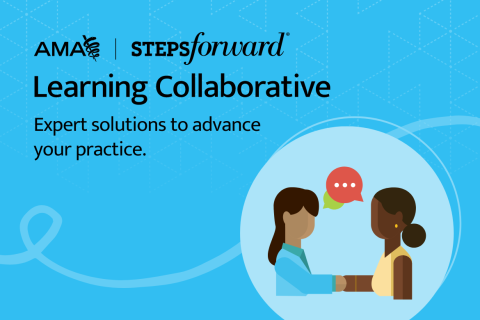The AMA STEPS Forward® Learning Collaboratives, part of the AMA STEPS Forward Innovation Academy, will help your organization improve in important areas of practice, including workflow, teamwork and clinician well-being. Our physician leaders, drawing from dozens of evidence-based STEPS Forward resources, offer guided facilitation and expert solutions to advance your practice.
Through shared experience in a group learning environment, the collaboratives will help you and your team implement best practices, improve efficiencies and put the joy back into medicine. Each learning collaborative involves four to ten physician-facilitated web sessions and may include an in-person session. Learning collaboratives will take place over multiple months and require participant commitment to executing system-level changes and measuring their effectiveness. Continuing Medical Education (CME) credits may be available for learning collaboratives.
The learning collaboratives convene dyads or triads of leadership representatives from multiple organizations to engage in a longitudinal shared learning experience.
During the program, participants will embark on a system-level change guided by our AMA experts and resources, and participants will be accountable for their own progress, communication and completion. By sharing successes and failures with others in the collaborative, participants can learn, iterate and improve their own efforts.
Current learning collaboratives
Reducing Administrative Burden
October 2025–April 2026
Through physician-led sessions and interactive group work, this collaborative guides participants through strategies to reduce physician administrative burden in ambulatory medical practices and processes to facilitate change.
Optimizing EHR and Clinical Technology Through Collaboration Between Operations and Informatics
October 2025–May 2026
This collaborative brings together informatics, clinical and operational leaders to optimize clinical technology through hands-on projects, shared goals, expert guidance and peer collaboration.
Past Learning collaborative topics
Past learning collaborative topics include:
- In-Basket Reduction: Optimizing and managing the in-basket to reduce work burden | October 2024–March 2025
- Reducing Regulatory Burden: Rethinking how rules are applied to clinical practice | October 2024–March 2025
- AI Governance: Building a framework for the ethical, equitable, responsible, and transparent use of AI in practice | April–November 2025
Testimonials
Hear what past participants have to say!
- "A really valuable experience. Learning from other health systems made it clear how we all face similar challenges and can share innovative solutions. This collaboration motivated me to bring back fresh ideas to support physician well-being."
- “Great collaboration. Loved it.”
- "Highly informative, offering valuable examples of innovative strategies. Hearing how other organizations approach these challenges gave us meaningful insights into changes we can make in our own processes."
- "The experience was beneficial for my organization in many ways. The program was efficient and provided action items that made the program very worthwhile. This was time well spent, enjoyable and productive."
Learning collaborative FAQs
Access frequently asked questions or download the list of FAQs (PDF). If you have additional questions, please email [email protected].




